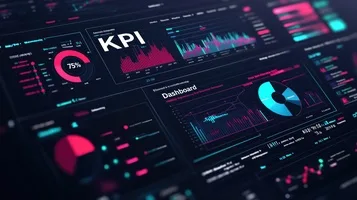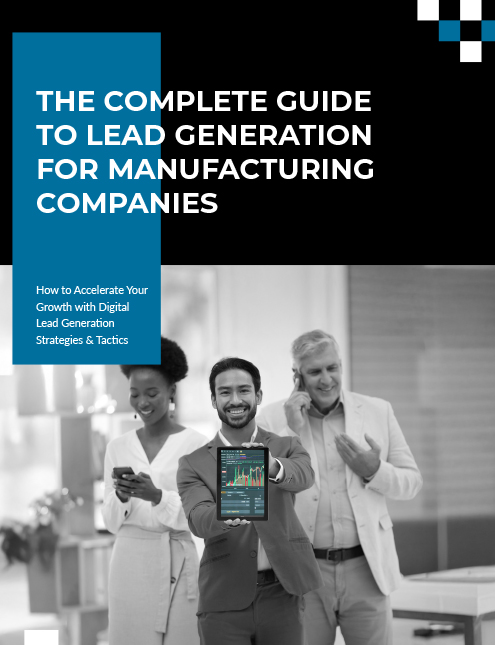Why Your Website Should Be Your Best Salesperson

Updated: November 11, 2025
Because buyers are making decisions long before they ever call you!
Is your website working as hard as your sales team? If you are in industrial sales, especially when your products are custom parts or engineered-to-order solutions, it’s easy to think that your website is just a digital brochure. It’s “just there” to support the sales team, and back up sales conversations, not start them.
But let’s rethink that. Today’s technical buyers are smart, busy, and highly independent. They are not sitting around waiting for a sales pitch. They are doing their homework online by researching, qualifying, comparing specs, reading reviews, and shortlisting vendors, often without a single phone call. They do all this due diligence long before they ever reach out.
So, here’s the big question: Is your website helping you make the cut or getting you cut out of the shortlist?
If your website isn’t actively working to attract, engage, and convert them, you’re leaving qualified leads and serious revenue on the table.
Some key questions you need to ask are:
- How do I turn my website into our best salesperson?
- Why does website content matter for custom manufacturing?
- Can B2B websites really generate qualified leads and propel them toward conversion?
- What fixes does my website need to attract more industrial buyers?
It isn’t enough for your website to simply support your sales process; it should be a key part of it. When done right, it works 24/7, helps your buyers help themselves, and turns passive traffic into qualified leads.
Key Takeaways
- Buyers research online before contacting sales – your site must engage them early.
- Treat your website like a 24/7 salesperson that educates and converts visitors.
- Use clear, detailed content tailored to custom manufacturing buyers.
- Good SEO isn’t enough – optimize UX to drive conversions.
- Simplify navigation, improve speed, and make CTAs highly visible.
- Provide technical resources like specs, CAD files, and case studies.
How Can My Website Attract Technical Buyers?
A new generation of engineers, procurement managers, and plant supervisors relies heavily on the web throughout the buying process. According to a 2024 survey by IEEE GlobalSpec:
- 77% of engineers say they use a vendor’s website to research products and services
- 66% of technical buyers say they typically create a shortlist before contacting sales
- Over 60% of B2B searchers now find what they need directly from search snippets – often without clicking through to a website.
Think of your website not as a static page, but as a 24/7 member of your sales team. A really good one. One that:
- Understands what your buyers need
- Answers their technical questions
- Builds credibility through case studies, specs, certifications, and capabilities
- Makes it easy to take the next step, whether that’s requesting a quote or downloading a datasheet
If your site doesn’t do all that, you’re not only missing opportunities, but also sending potential customers to your competitors!
Turn your website into a 24/7 sales machine – let’s talk!
Make your website your best salesperson. We help you boost performance, improve UX, and drive more qualified leads.
Why Does Website Content Matter for Custom Manufacturing?
When you offer custom-engineered parts, your solutions aren’t easy to box into standard categories. That’s exactly why your website needs to communicate:
- What do you specialize in?
- What industries do you serve?
- What are your technical expertise and problem-solving capabilities?
- How does your custom process work? (Because buyers want to know!)
Buyers don’t want to guess. The more transparent and informative your content is, the easier it is for them to confidently say, “Yes, this is the right partner.”
If your website doesn’t clearly communicate your capabilities, provide instant value, and make it easy to take the next step, you won’t even make the shortlist.
B2B Selling Involves Multiple Decision Makers. Does Website Ranking Matter?
Many industrial companies are proud of their strong SEO rankings, and rightfully so. But visibility doesn’t always translate to viability. A high-ranking website simply isn’t enough.
You might be ranking #1 for “custom metal fabricator in Ohio,” but if your site:
- Lacks clear calls-to-action
- Doesn’t explain your process
- Takes too long to load
- Doesn’t work well on mobile devices
- Has confusing navigation
…you’ll lose that lead in seconds.
Conversion rate optimization (CRO) is what turns visibility into a pipeline with qualified, high-quality website leads. It’s the process of taking the traffic you earn and making sure more of it becomes sales opportunities. When your website removes friction, leads come in warmer, faster, and more ready to buy.
What Fixes On Our Website Will Attract and Engage Technical Buyers?
To turn your site into your most effective salesperson, you must tailor your content and experience to the way engineers and industrial buyers think.
Start here:
- Make navigation intuitive; buyers shouldn’t have to scroll, dig, and scratch their heads
- Use plain language alongside technical details
- Show proof of performance with real-world examples
- Optimize for mobile (yes, even your engineers browse on their phones!)
- Include clear calls-to-action, such as: “Request a Quote” or “Upload Your Specs”
Here’s what works
✅ Detailed Product/Service Pages
Even for custom parts, give examples of applications, tolerances, materials, and industries served. Don’t assume visitors will fill out a form to learn more.
✅ CAD Files, Spec Sheets, and Case Studies
Technical buyers want to validate that you “get” their needs. Providing downloadable resources shows expertise and builds trust.
✅ Fast, Mobile-Friendly UX
Today’s buyers research from the field, the floor, and the boardroom. Your site must load fast and work seamlessly on mobile.
✅ Clear, Low-Friction CTAs
Make it easy to request a quote, ask a technical question, or schedule a consultation. Use forms that are short and to the point.
✅ Proof of Performance
Show results. Use customer testimonials, before-and-after examples, and process breakdowns to demonstrate value.
How Do I Measure Marketing ROI from Our Website?
Even as a custom-parts manufacturer, you can track meaningful ROI from your website. Here’s how:
- Set Up Clear Conversion Goals
Use Google Analytics 4 to track RFQ submissions, form fills, phone clicks, and file downloads.
- Track Lead Quality, Not Just Volume
Integrate website forms with your CRM to understand which sources bring the best-fit prospects.
- Monitor Sales Funnel Impact
Look at how many opportunities originate from web leads and how they perform through your sales process.
- Measure Cost Per Lead and Opportunity
Divide your website investment by the number of qualified leads or closed deals it generates to track ROI over time.
Yes Indeed! Your Website Can Sell Custom Parts. Here’s the Key:
Even if you build highly specific, one-off components, your website can expertly guide the B2B sales process. Start by thinking like your customer and building a site that speaks their language. Here’s how:
- Educate your ideal customer
- Differentiate your capabilities
- Pre-qualify leads for your sales team
- Deliver measurable return on investment
It’s not about automating the sale. It’s about enabling your site to do the heavy lifting upfront, so your sales team spends more time closing, not chasing.
Ready to Turn Your Website Into a High-Performing Sales Asset?
At Marketing Metrics Corp., we specialize in account-based marketing to help B2B manufacturers and industrial companies create websites that drive real results, even in custom, complex, high-spec environments.
Click on a star to rate this post!





